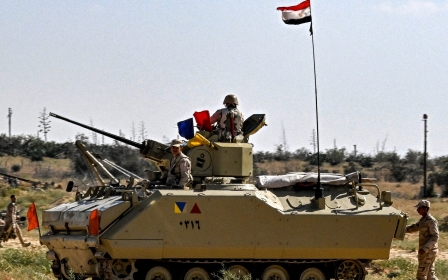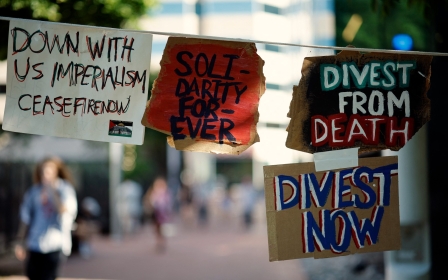War on Gaza: Israeli army pounds Rafah as 250,000 Palestinians face ejection

The Israeli military heavily bombed Rafah early on Monday morning, before ordering up to 250,000 Palestinians to leave parts of the border town ahead of a threatened ground assault.
At least 22 civilians, including eight children, were killed in air strikes that hit 11 homes across Rafah, according to the Palestinian news agency Wafa.
The Israeli military dropped flyers ordering displaced people and residents to leave the eastern areas of the city near the fence that separates the Gaza Strip and Israel.
It said the military was “about to operate with force against the terror organisations in the area”.
Aid organisations warned that an attack on Rafah would not only be catastrophic for civilians in the area, but will also have a major impact on their ability to get food to northern Gaza where the UN World Food Programme chief has said a "full blown famine" is now under way.
Stay informed with MEE's newsletters
Sign up to get the latest alerts, insights and analysis, starting with Turkey Unpacked
"It is going to be catastrophic," Ziad Issa, head of humanitarian policy at the UK-based ActionAid, told Middle East Eye on Monday.
"Any prospect of getting aid inside Gaza now is very grim."
'There are no safe zones in Gaza. Whatever you hear from the Israelis, it's all lies'
- Ahmad Abu Rizq, Gaza resident
Issa said people in Rafah are panicked, concerned that they will not be safe even if they evacuate given their experiences in Gaza over the past seven months.
“People have been following evacuation orders since 7 October, yet you see people attacked in places where they have moved," Issa told MEE. “The concept of a safe zone is a very outdated concept.”
Melila Abu al-Khair, a Palestinian woman displaced in Rafah, said she will not be leaving her makeshift tent in Rafah because she simply has no alternative.
"My uncle is a kidney dialysis patient on a wheelchair. We have no cash and nowhere else to be. We don't know where we would go," Abu al-Khair told MEE.
"We will only die once. Let the army come and kill us here. But we will not leave."
Abu al-Khair, who is from Gaza City, said she has already been displaced several times. She had taken shelter at her home, her family's home and a school, which were all attacked.
"Where shall we go?" she asked.
While some people like her have refused to leave, others were seen fleeing the areas marked in the Israeli army orders.
Ahmad Abu Rizq, who has been taking shelter in Rafah, said he began moving the family's belongings once the orders came but with no destination in mind.
"I don't know where I'm going. They said there could be areas in the Mawasi area and that's where I'm headed. But I have no tent and I don't know if I'll find a place there," Abu Rizq told MEE.
He added he was forced to flee to relocate his daughter, who has a disability, away from the potential ground assault, but still feared it won't be enough to keep her safe.
"There are no safe zones in Gaza," he said. "Whatever you hear from the Israelis, it's all lies."
Lack of clarity
According to Issa, Israel's ejection order also lacks clarity about how quickly people should leave and when they would be able to return, increasing uncertainty and anxiety.
It is also unclear what will happen to people who can't move, including patients at Abu Yousef Al Najjar Hospital, the main medical facility currently serving the Rafah governorate.
Issa said ActionAid does not have international staff in Gaza, but the organisation has been made aware that staff of other international NGOs are receiving orders to leave Gaza entirely through the Rafah crossing.
The United Nations agency for Palestinian refugees, Unrwa, warned an Israeli offensive would have “devastating” consequences and has said its staff will not evacuate the city.
"The agency will maintain a presence in Rafah as long as possible and will continue providing lifesaving aid to people," the agency said on X.
Unrwa previously complied with Israeli orders to leave northern Gaza, a decision that was criticised by Palestinians who accused it of abandoning people who rely on its services.
Evacuation timing
The evacuation orders came a day after a deadly Hamas rocket attack on an Israeli military site east of Rafah, and as mediators pushed for a ceasefire and a prisoner swap deal.
The Hamas attack on Sunday killed four Israeli soldiers and seriously wounded others after rockets hit a military site in the Kerem Shalom area.
The Israeli army closed the Kerem Shalom crossing with Gaza after the attack.
Also on Sunday, a Hamas delegation left Cairo for further consultations with the group’s leadership in Doha after two days of negotiations with Egyptian and Qatari mediators.
CIA director William Burns, who was also in Cairo over the weekend, flew to Qatar on Sunday night to continue pushing for a deal.
He is expected to fly to Israel on Tuesday.
In a phone call with US Secretary of Defence Lloyd Austin, Israeli Defence Minister Yoav Gollant said that Israel made “many efforts” to reach an agreement, his office said on Monday.
He added that Hamas’ “refusal” has left Israel with “no choice” but to operate in Rafah.
Last week, Israeli Prime Minister Benjamin Netanyahu vowed to proceed with an offensive on Rafah even if a deal was struck.
Meanwhile, Hamas has accused Netanyahu of obstructing a deal.
The Palestinian group has insisted any potential deal must include a permanent end to the war while Israel is seeking only a temporary pause.
Sami Abu Zuhri, a senior member of Hamas, told Reuters the Israeli evacuation orders from Rafah were a “dangerous escalation that will have consequences”.
Humanitarian consequences
Israeli leaders have threatened an offensive in Rafah for months despite widespread opposition by world leaders and humanitarian organisations.
The US, a staunch ally of Israel, has repeatedly said it does not support a massive Israeli assault in Rafah that does not take into account the safety of civilians.
Rafah had become overcrowded with civilians who fled Israeli bombardment in other parts of the Gaza Strip in recent months.
There are an estimated 1.4 million people taking shelter in makeshift tents in the small town.
US Secretary of State Antony Blinken said on Friday that Israel has not yet presented a plan to protect civilians in Rafah, saying a major military operation there would cause damage “beyond what's acceptable”.
Jens Laerke, spokesperson for the UN humanitarian office, also on Friday said an Israeli offensive there “could be a slaughter of civilians”.
He warned the humanitarian operation in the entire coastal enclave will suffer an “incredible blow” because they are run primarily out of Rafah, which has the only Palestinian land crossing not directly controlled by Israel.
The seven-month Israeli assault on Gaza has already devastated the Palestinian enclave and caused a humanitarian crisis.
The Israeli military has killed at least 34,600 Palestinians, the majority of them children and women, while a siege on the coastal enclave has left it on the brink of famine.
Middle East Eye delivers independent and unrivalled coverage and analysis of the Middle East, North Africa and beyond. To learn more about republishing this content and the associated fees, please fill out this form. More about MEE can be found here.







